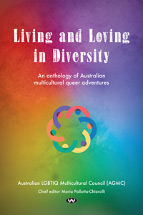Living and loving in diversity edited by Maria Pallotta-Chiarolli

Wakefield Press, 2018. ISBN 9781743055953
(Age: 16+) Recommended. Non-fiction. Subtitled An anthology of
Australian multicultural queer adventures, this book brings
together the memories and personal stories of many LGBTIQ people,
some of whom are well-known names many Australians will recognise,
others perhaps not previously encountered. My first impression on
perusing the contents was that there were so many stories, perhaps
too many. But it is a good thing really because the collection
provides such a wide array of voices and experiences, that the
reader soon discovers there is no one typical story, no stereotype
they may have imagined; the stories are as diverse as any random
group in the community. People come from different backgrounds,
different cultures, they have had different childhood experiences -
some positive and affirming, others sadly too often have experienced
bullying and fear. For many there was confusion and anxiety as they
gradually explored their sexual identity. Hopefully this book will
go a long way to help generate better understanding and acceptance.
Each reader will find stories that are of particular interest or
that resonate more strongly for them. For me, I liked the new
insight gained from reading 'A QPoC Manifesto: Fighting for
invisibility in a world that loves to talk' by Nonno and Aroosa. The
writers confront the Western notion of 'coming out' as the best way
to live, almost a rite of passage that all LGBTIQ people are
supposed to achieve. They argue that sometimes it is better not to
come 'out of the closet' but to invite people into a trusted space
when they are ready to be a part of it. For many whose cultural
upbringing places such a high value on family and family
expectations, it is not the best thing to confront and challenge.
Some may choose to maintain a balancing act between privacy and
'outness'. Their suggestions for how to become an awesome friend is
to respect that privacy including in social media - particularly
don't post photos of people without their permission.
For others social media has been the means of overcoming social
isolation, discovering new friends, support groups and a community
of acceptance. Another poignant story questions the ethics of the
Western insistence on performing surgery on 'Partial Androgen
Insensitivity Syndrome' or intersex children before they are able to
consent, insisting that they must be brought up as one or other
gender, whereas other cultures may be more accepting of their
'special person of both sexes for whom the gods had a special
place'.
There are many more themes explored in these stories: the
experiences of people with a disability, the impact of AIDS, and
experience of racism in the LGBTIQ community. However what comes
through most strongly is that despite the difficulties they may have
gone through, these are people who have found who they are, they
have confidence and self-acceptance, and they have found love and
acceptance from others.
It is a positive and affirming book that may be helpful to anyone
struggling with their sexual identity, and also for others to gain
better understanding.
Helen Eddy